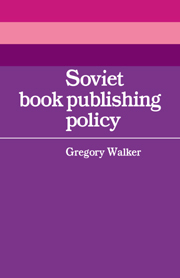Book contents
- Frontmatter
- Contents
- Acknowledgments
- Glossary of specialised terms
- Note on transliteration
- References to journals and series
- 1 Introduction
- 2 The political and economic view of Soviet publishing
- 3 The Communist Party
- 4 The government apparatus
- 5 The publishing-house
- 6 The author
- 7 Printing, paper and supplies
- 8 The book trade
- 9 Special kinds of publication
- 10 Conclusions
- Appendix 1 Authors' fee scales
- Appendix 2 All-union book retail prices
- Notes
- Select bibliography
- Index
3 - The Communist Party
Published online by Cambridge University Press: 07 October 2011
- Frontmatter
- Contents
- Acknowledgments
- Glossary of specialised terms
- Note on transliteration
- References to journals and series
- 1 Introduction
- 2 The political and economic view of Soviet publishing
- 3 The Communist Party
- 4 The government apparatus
- 5 The publishing-house
- 6 The author
- 7 Printing, paper and supplies
- 8 The book trade
- 9 Special kinds of publication
- 10 Conclusions
- Appendix 1 Authors' fee scales
- Appendix 2 All-union book retail prices
- Notes
- Select bibliography
- Index
Summary
Having noted in the previous chapter the ‘leading role’ which is attributed to the Communist Party (CPSU) in publishing, as in other matters, we review in this chapter the institutions and methods through which the Party participates in book publishing policy: the apparatus of the Central Committee and its Secretariat; the powers of the Party at the level of the individual publishing-house, and in the printing industry and the book trade; the Party as a publisher in its own right; and the general character of the Party's exercise of its authority.
The Central Committee and the Department of Propaganda
Party intervention at the highest level, in the name of the Politburo and the Central Committee, comes most usually in the form of Central Committee decrees on a wide variety of topics, both general and highly specific; and less frequently by means of individual leaders' pronouncements on which the publishing industry is expected to take action. Most of the decrees are likely to originate in proposals from the Secretariat of the Central Committee, and are believed to be issued in most instances on the authority of the Secretariat's own standing executive apparatus, without the need for ratification by the Central Committee itself. The Secretariat's Department of Propaganda (until 1966 the Department of Agitation and Propaganda) maintains standing contact with the State Committee for Publishing, Printing and the Book Trade, the government organ which administers the sector as a whole.
- Type
- Chapter
- Information
- Soviet Book Publishing Policy , pp. 18 - 27Publisher: Cambridge University PressPrint publication year: 1978

